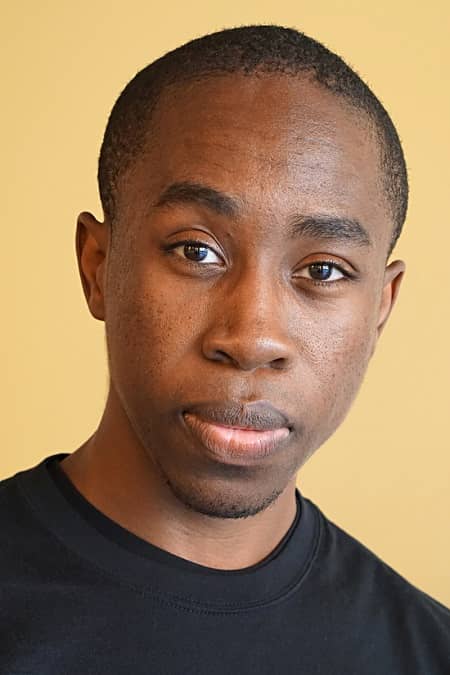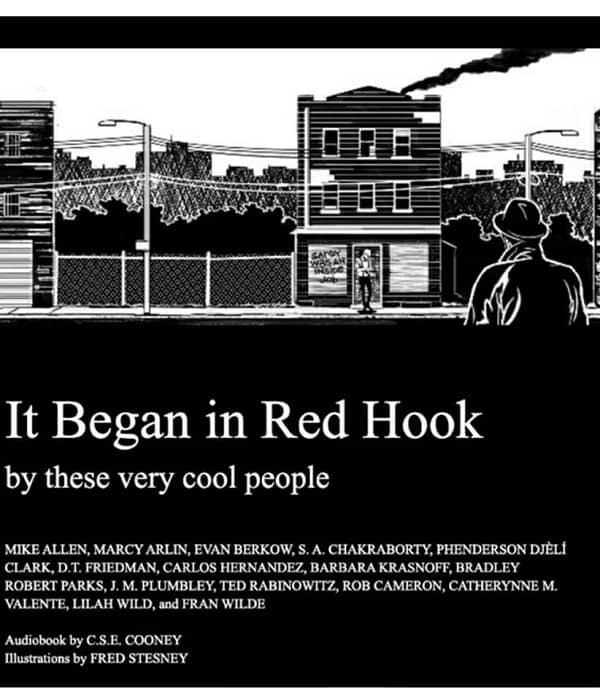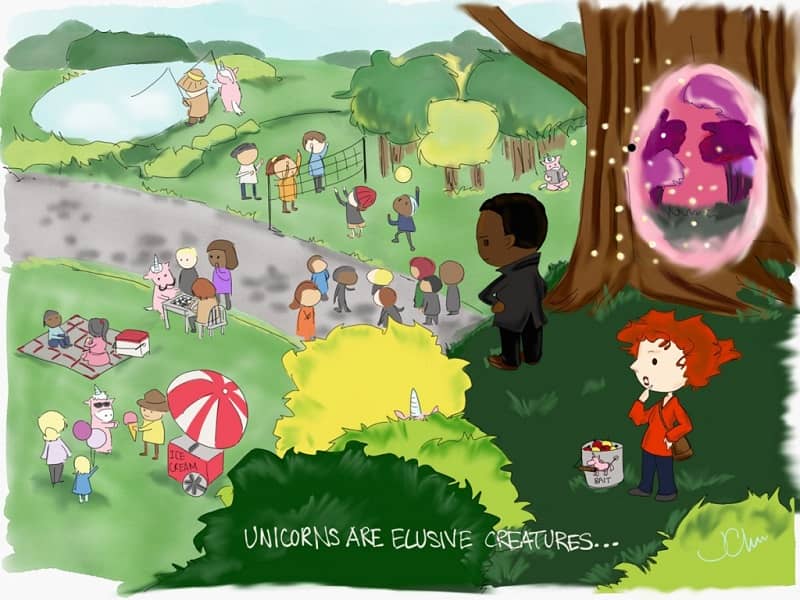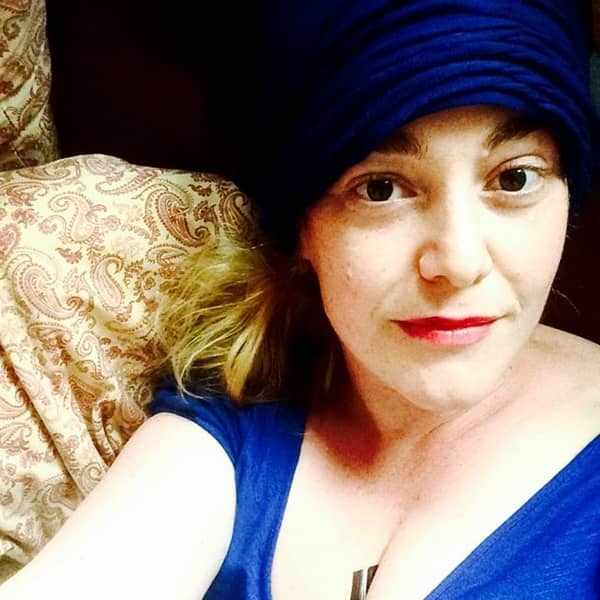Pie and a Slice of Sky: An Interview with Brooklyn Writer Rob Cameron
Writer Cameron Roberson (Cam Rob)
of Brooklyn SF Writers group & Kaleidocast
Greetings, Black Gaters! I’m here today with an interview for you with Rob Cameron, or “Cam” as I like to call him, a New York speculative fiction writer, among — as you will see — other things.
Cam was one of the first friends I made in New York City. Wait, let me take that back a few steps. It all started with Readercon, as so many things (including my marriage) do! It was probably Readercon, circa 2015. I was attending a panel to hear Ellen Kushner talk about something very interesting that I cannot now recall. I do recall that she opened the panel up to questions very early — which is one of her neat tricks: she’s there to serve the audience, and wants to talk about what interests them most. One of the first questions from the audience — and I remember thinking it was very keen and interesting — came from a bright-eyed young man who was sitting on the edge of his seat, leaning forward, as if he wanted to be the first to hear everything. He obviously knew Ellen, and she him, but I didn’t know him, and I thought, “Well! He must be a friend I haven’t met yet!” and determined at that moment to fulfill my own prophecy and get to know him better.
It turns out that this gentleman was none other than Rob Cameron, writer, gamer, teacher, as well as one of the main movers and shakers of the Brooklyn Speculative Fiction Writers and Kaleiodocast, the podcast they produce, which features fiction by and interviews with speculative fiction writers, and also stories that occur in a shared world.
The more I got to know him, the more I realized Cam was at the heart of New York’s electric, eclectic, thunderous spec fic scene, deeply involved in a community of writers all rising together, reading and critiquing each other’s work, attending events and conventions, and learning the business of being a writer. I thought he’d be a fantastic person to interview for Black Gate, so that we could all share in some of his knowledge, wisdom, and love of pie. After all — ’tis the season for pie. But then, when isn’t it?
[Click the images for Cameron-sized versions.]
CSEC: Mr. Cameron, you have many vocations: teacher, podcast editor, writing group organizer, pie-eater, and writer! How do all these branches of work feed into each other?
RC: Pie is alpha. Pie is omega. Everything else is filling. ? I’ve been teaching in New York for going on thirteen years, and that comes with the kind of job security that allows me to write without anxiety over the next paycheck. There is a symbiosis between my work on the Kaleidocast, organizing work for Brooklyn Speculative Fiction Writers, and my writing, so I work hard to make time for them all. Also, it’s a way of giving back. I wouldn’t be the writer I am today if not for BSFW. But now that I’ve got a kid, the difficulty rating now requires prestige class, level 9 focus.
Where do you get the energy to do all of this? What do you do to rejuvenate yourself, and what do you do on your time off?
That’s a very good question, considering I am narcoleptic. Not sure, to be honest. My girlfriend has noticed that my vacation tends to be filled with my writing, podcast production, and BSFW business. Having a deadline really helps.
Dungeons & Dragons, rock climbing (when I can afford it), parkour (when I can find the time), martial arts (used to teach it) video games (still suck at it), baking, and board games. Lately, teaching my four-year-old daughter the fine points of hide-and-go-seek.
Also, what the heck is Dragon Boat racing? (IN YOUR OWN WORDS, I BEG YOU! DON’T MAKE ME GOOGLE!!! THE HORROR!!! THE RABBIT HOLE HORROR!!!)
Don’t worry, this Google hole is a safe one. You’d need to scroll down through at least thirty seconds of images before you came across anything truly eyeball numbing. But here’s the short of it: Dragon boating is a 2,000-year-old Chinese boat racing competition. Imagine twenty paddlers, a steersman standing up in the back of the boat, and a drummer in the front of a really long, fiberglass canoe with a dragon’s head and tail, racing 500 to 2,000 meters. That’s dragon boat, and we race all over the world. My last race was in Puerto Rico.
How did you get involved in the Brooklyn Speculative Fiction Writers?
I’d just finished DMing a year-long Dungeons and Dragons campaign, 3.5 edition for readers who are curious. My girlfriend at the time suggested that I try to turn my game into a book, since I’d put so much time into writing it (We’re talking SERIOUS time. Even went so far as to create pre-game recap trailers on Windows movie maker). I got over 500 pages in when I realized this wasn’t the story I really wanted to tell and started looking for real help. That’s when I found Brooklyn Speculative Fiction Writers on Meetup.
BSFW was small then, with only one critique session for novel and short stories, combined. Still, that meeting was life changing. I learned so much from the people critiquing my story as well as the work of critiquing others. Just being in the room with fellow weirdos was worth the hour and a half commute from Forest Hills to Crown Heights. It is my nature is to get involved wherever I see potential, and Brad was already eager to expand the group. One critique session begat two, and then there were many.
What do you find useful about a writing group?
Well, first and foremost, the critique sessions. I’m a teacher, and one thing that I see time and time again is that the success of an educational experience can become too dependent upon the strengths and weaknesses of a single instructor/expert. This is an upside-down pyramid that over relies on the individual temperament, perspective, and depth of knowledge of a single expert. However, if the learning experience is organized around the shared expertise of the community, with the leader acting more as guide and facilitator, then combined experience of the group along with focused engagement on a draft will be more fruitful for everyone involved. There’s more buy in. it becomes more fluid. Patterns emerge. Given the right structure, like the Clarion method, this process becomes all the more productive over time as comfort and individual expertise grows. That’s a very long-winded way of saying we more quickly become better artists together than we might working completely on our own, hiding behind our egos and anxieties.
This is particularly evident in the novel critique sessions where we ask authors to bring in outlines and chapter summaries. This way we’re able to save the writer hours, possibly days, of rewriting as we critique and give ideas about how to structure their novel and not get caught in plot holes.
Besides the critique sessions, being in a writing group builds community that will support you on your bad days, celebrate you on your best, and later, turn into a shared platform, which is so important to getting your book seen and bought. I should say that these are the benefits of being in BSFW. I can’t speak to all writing groups, since I’ve only had experience with this one.
How is it organized? Were you a founding member? How big is it?
Bradely Robert Parks is the founder. When member decides they want to step-up and contribute to the community then we-Brad and I- decide if they have the temperament to be organizers.
Membership wise, I’d say we’re about a hundred members strong. But the organization has branched out quite a bit. From a single novel/short story critique session we’ve grown to three short story critique sessions, two novel critique sessions, a writing room, and an on-the-spot critique meeting. In September we’ll be opening a critique session in Harlem, which is our second in Manhattan.
What has changed about the group since it was started?
I’d say refinement and strength of the organization team. All twenty of our organizers are volunteers. Nobody gets paid for anything, yet everyone wants to find a way to contribute because we genuinely like each other. Jonathan Hernandez, for example, is a longtime member and the artists who drew the BSFW logo for us. It’s an amazing piece of art that says everything you need to know about BSFW: the fantastic dragon and the futuristic cityscape in the background, tied together by the Brooklyn Bridge.
Where did Kaleidocast come from?
To be honest, I’m not sure where Brad got the idea, but I got to name it and Marcy Arlin introduced us to our theme music. Sam Schreiber gave us the podcast/radio drama format that makes it unique (and more time consuming). The reason for its existence is to spotlight the professional work of our writers, and become a new, more stable market for speculative fiction.
What made it succeed when other groups don’t flourish as well?
Well, ask me this question in five years. We’re still pretty new. But the reason we keep coming back for more is because we love our community. We get to produce stories for some of the best speculative fiction writers in the world and showcase new writers. Very often, those two categories end up overlapping. We’re hoping to pay pro rate by Season Three. With your help, dear readers, we can.
Do you have any advice for writers trying to build a writing group from scratch?
Yes. Go to BSFWriters.com and click the “About Us” tab. We give tips on how to start your own group. Or you could just join us. Either way, if the spirit behind your group is collaborative, organized, and respectful, you can’t go wrong.
What are some spec-lit projects you are particularly proud of, why?
Besides the Kaleidocast? The debut novel I’m working on with Barry Goldblatt is the first story I felt deserved the energy it requires to sustain a novel. In it, I get to explore the dark forest at the edge of childhood and fill it with monsters of my own making. When not working on that, I’m creating con-languages for a second world sci-fi/fantasy grim dark novella I’ve been toying with for the last couple years. Also short stories.
If you could submit a short story to some (as it were) pie-in-the-sky dreamboat anthology by an editor you’ve admired for years, what would the subject of the anthology be?
Old Gods and Shapeshifters, by Ellen Datlow. She’s always been top of my list. I had the opportunity before and I didn’t have the writing chops. Now I do. Navah Wolfe’s Starlit Wood is my favorite anthology in the last 5 years (outside of VanderMeer’s Big Book of Science Fiction). I would love to be in anything that she’s working on, but especially something folk or fairytale related. Also, if someone were to invite me to write stories in ye olde Dragonlance: World of Krynn, I wouldn’t be mad at them. Not one bit.
And who would you love to be ToC siblings with?
My fairy godmother, Delia Sherman. Queen of Swords Ellen Kushner. Sister from another Mister, S.A. Charkraborty. African Dragon Slayer Essowe Tchalim. The Disgruntled Hardin, Phenderson D. Clark. My peeps at BSFW. Also Nalo Hopkins because, why not shoot for Pluto?
In the last ten years or so, we have seen an increased awareness of identity politics in SFF writers and in the culture at large. As an emerging SFF writer, is identity something you address in your own work?
Authors are artists. For artists to do their best work, we must nurture our own truths. At this moment in history, identity politics is a relevant third rail. As dangerous and convoluted as this topic is, I can’t not address it and consider myself to be a black man of sound mind and body, which I do. As to how I do it, this I think is where the nurturing comes in, because there can’t be any one way. As we explore what it is to be human, black, American, we also need to make room for definitions to bend like light.
There are vaults worth of stories to tell here, I just pick the ones that seem the most personal. The more personal, the more care is necessary to tell it, the better the story, the more deeply it can root the readers experience. I’m not sure if I answered your question, but those were some fun words to write.
What are you hoping for and working towards in your own art, and as part of the larger conversation in the SFF field?
I just want to be really, really good at taking all the weirdness insides of my heart and connecting with readers.
What are you working on?
Dismantling the Evil Empire.
What’s next for Rob Cameron?
Pie.
Rob Cameron (though not his real name, it is written on all of his bylines) writes strange stories, one of which, “Squeeze” (a 3-star review on Tangent!) can be found in Mike Allen’s anthology Clockwork Phoenix 5 (Mythic Delirium, 2016). Cameron . . . I mean, Rob, is managing editor for the Kaleidocast, a lead organizer for the Brooklyn Speculative Fiction Writers, sometimes curator for the New York Review of Science Fiction‘s Reading Series, the Surreal Symphony of Zak Zyz, and a pie addict with neither regrets nor inclinations towards rehab. Rob is a linguist, an ENL teacher in Brooklyn, and proud participant of the Carterhaugh School of Folklore and the Fantastic. When not hunting pies in their natural habitat, engaged in spec-fic related activities, or dragon boat racing (it’s a real thing), he’s researching Afro-futurism, folklore and the causes + cures for toxic masculinity. Fun fun! Find him at: at his website, on Facebook, and on Twitter.
C.S.E. Cooney lives and writes in the Borough of Queens, whose borders are water. She is an audiobook narrator, the singer/songwriter Brimstone Rhine, and author of World Fantasy Award-winning Bone Swans: Stories (Mythic Delirium 2015). Her short fiction can be found in Ellen Datlow’s Mad Hatters and March Hares: All-New Stories from the World of Lewis Carroll’s Alice in Wonderland, Jonathan Strahan’s Best Science Fiction and Fantasy of the Year Volume 12, Paula Guran’s 2016 The Year’s Best Science Fiction & Fantasy Novellas, five editions of Rich Horton’s Year’s Best Science Fiction and Fantasy, Mike Allen’s Clockwork Phoenix Anthology (3 and 5), Lightspeed Magazine, Strange Horizons, Apex, Uncanny Magazine Black Gate, Papaveria Press, GigaNotoSaurus, The Mammoth Book of Steampunk, and elsewhere.



